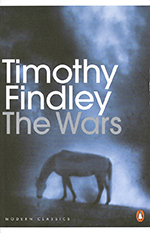 The Wars is my second Timothy Findley novel, the other being Famous Last Words. That they both wound up being war novels is a coincidence. I did try The Piano Man’s Daughter when I was younger, which was recommended to me by someone after I’d told them how much I loved The Stone Diaries, but I put it down before finishing the first chapter out of utter fucking boredom, and I never went back to it. Famous Last Words was better, and fortunately so was The Wars.
The Wars is my second Timothy Findley novel, the other being Famous Last Words. That they both wound up being war novels is a coincidence. I did try The Piano Man’s Daughter when I was younger, which was recommended to me by someone after I’d told them how much I loved The Stone Diaries, but I put it down before finishing the first chapter out of utter fucking boredom, and I never went back to it. Famous Last Words was better, and fortunately so was The Wars.
The framing device of an unnamed historian or researcher with no clear identity of their own examining the life of Robert Ross is a bit strange; it doesn’t cohere in any meaningful way, but it does make the primary narrative extremely unreliable. Ross also feels under-developed. We know he’s sensitive, unsure of his sexuality, dislikes violence but is comforted by the authority his automatic pistol grants him, and he cares for animals, but actually very little beyond that, by which I mean that I couldn’t necessarily predict how he might respond to any given situation, and it makes his emotional development difficult to become invested in. This detachment eventually becomes alienation as Ross wades hip deep into the Great War. The scenes of carnage Ross witnesses are disturbing, but their emotional intensity comes indirectly, through his connection with the animals caught up in the war, some work animals, some simply wild animals or pets displaced by the madness. The reader is (mostly) kept at a similar distance from Ross’ life at home, and many of the few exceptions are centred on animals; the unnecessary killing of his beloved sister Rowena’s rabbits becomes a greater blow than her own death.
With The Wars I feel like I’ve entered an era of CanLit that has stopped seeing class as a primary concern or anyone beyond the middle class as part of its core audience. Findley’s novel essentially ignores any soldier—indeed, any person—not wealthy or at least middle class, and very clearly assumes the audience will come from a similar background. We see the Great War, or half see it, really, through the eyes of an officer whose rank was guaranteed by his class rather than his competence, and though Ross takes the responsibilities of rank seriously, he’s not a born soldier, and the only real glimpse we get of those under him both in the trenches and at home show them as panicky, unthoughtful, or corrupt. “A mind that’s weak and a back that’s strong” to quote the old Merle Travis song.
The Wars is a well-executed First World War novel with some interesting technical flourishes and some interesting thematic concerns[ref]Although some of them have been handled better by Pat Barker.[/ref], but the framing device isn’t explored enough to realize its full potential, and the book feels too brief for all the ground it tries to cover. Famous Last Words was stronger in nearly every way.